Technosomata. Transhistorical and Intersectional Perspectives
Symposium
July 5th and 6th, 2021 - online via zoom and wonder.me

(Illustration/Layout: Tatiana Hahn)
This two-day symposium builds on a cooperation between Humboldt-Universität zu Berlin (Department of Classics and Centre for Transdisciplinary Gender Studies) and Exeter University (Centre for Medical History and Centre for Knowledge in Culture in Antiquity and Beyond). It is the fourth in a series of workshops and conferences organized since 2019.
Technology produces, configures, and (re-)shapes gender and sexuality. The field of Feminist Science & Technology Studies has long identified a set of concerns arising from the increasing capabilities of modern science and technology, inseparably intertwined, to alter bodies radically. Both scientific knowledge production and technological developments constitute themselves within social and cultural entanglements, and simultaneously intervene in socio-cultural bodies, for example in their possibilities and enhancements, but also in their vulnerabilities, reproductions, and sexualities, their social enactment, roles, and hierarchies, and their desires, affects, and sexual identities. Yet, it is a mistake to see the technological reshaping of bodies, desires, and identities as an exclusively modern phenomenon that raises uniquely modern questions and challenges.
The interdisciplinary symposium Technosomata. Transhistorical and Intersectional Perspectives proceeds from two premises. First, that the intersection of technologies, bodies, gender, race, class, sexuality, and reproduction is a facet of ancient just as much as modern cultures, and can be studied across various historical periods. Second, that these complex and long histories and the debates around them can deliver both genealogical as well as context-specific insights from particular times and cultures.
Contemporary feminist, queer, and intersectional scholarship therefore should be based on discussing such temporalities from a transdisciplinary perspective in order to develop positions that meet these challenges in the contemporary world. This symposium brings together scholars from History, Classics, Gender Studies, Feminist Science & Technology Studies, Philosophy, Cultural Studies, Political Science, Linguistics, Computer Science, and the Arts to discuss these topics with a broad audience. Presentations, discussions, museum visits and activities, and an artist talk and performance lecture will facilitate a face-to-face exchange between academia, arts, and activism.
Registration was open until 1st of July 2021.
July 5th 2021
- 15:00-15:15 Check In
- 15:15-15:45 Get into the Topic
16:00-17:30 Panel 1: Life and Techne
- Sofia Varino (HU Berlin): Can Zöe Speak? Viral Biopolitics in the Anthropocene
- Maria Gerolemou (University of Exeter): Women in Tech: Pandora, Pasiphae, and Other Women
Chair: Rebecca Langlands
17:30-18:00 Tea Break in wonder.me
18:00-19:10 Prosthetic Visions: A Workshop
- Moderation: Sigrid Schmitz (HU Berlin) and Sofia Varino (HU Berlin)
(as an option for the individual preparation of workshop participants, please find a
PDF-file with links to film examples and some of the questions for discussion here)
July 6th 2021
13:30-15:30 Panel 2: Language About and in Technology
- Giulia Maria Chesi (HU Berlin): Helen’s drugs, techne and language in Odyssey 4
- Hannah Fitsch (TU Berlin): Principles and Effects of a “Mathematization of Perception” in Neuroscience
- Sigrid Schmitz (HU Berlin): Techno-Brainbodies: Transgressive Potential and Normative Enhancement
Chair: Kate Fisher
15.30-16:00 Tea Break in wonder.me
16:00-17:30 Panel 3: Boundaries, Plasticities & Futures
- João Florêncio (University of Exeter): Antiretroviral Time
- Ute Kalender (Charite Berlin/ Gen-ethisches Netzwerk): Xenofeminism and the Reproductive Body: Problems and Potentials
Chair: Elisa Groff
17:30-17:45 Looking Forward
with João Florêncio (University of Exeter) and Sofia Varino (HU Berlin)
Further Information
All scheduled times are CET (Central European Time).
The Technosomata project since 2019 (website of the University of Exeter): https://humanities.exeter.ac.uk/classics/research/projects/thetechnosomataproject/
Shortlink to this event page: https://hu.berlin/technosomata
